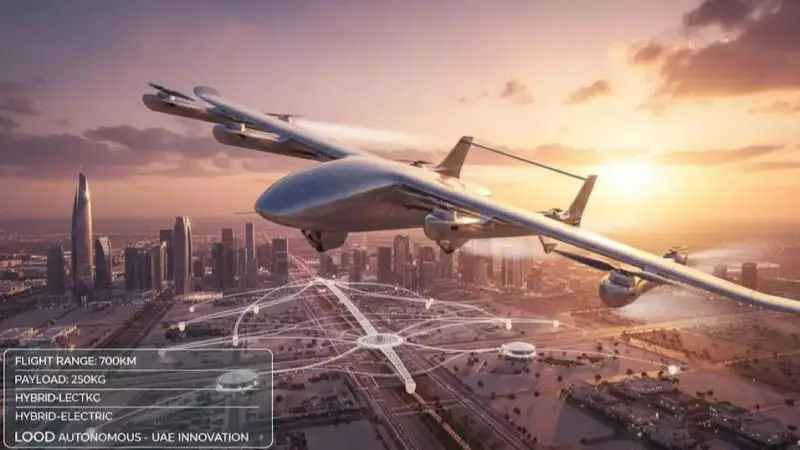
The United Arab Emirates has achieved a groundbreaking milestone in aviation history with the successful launch of Heli, the nation's first-ever hybrid autonomous cargo aircraft. This revolutionary development positions the UAE at the forefront of sustainable air transport innovation and marks the region's first civilian heavy cargo aircraft capable of operating without traditional airports.
Heli's Revolutionary Design and Capabilities
Developed entirely by Emirati company LOOD Autonomous and fully designed, developed, and manufactured within the UAE, Heli represents a significant technological leap. The aircraft's successful maiden flight was witnessed by Sheikh Zayed bin Mohammed bin Zayed Al Nahyan, underscoring the project's national importance.
What makes Heli truly remarkable is its unique hybrid design that enables it to take off and land vertically like a helicopter while flying like a conventional airplane. This eliminates the need for traditional runways and airports, opening up new possibilities for cargo transportation.
The aircraft features a sophisticated dual propulsion system that seamlessly switches between electric power for vertical lift and fuel-assisted flight for long-range cruising. With a payload capacity of 250 kilograms and an impressive range of 300 kilometers, Heli is specifically engineered for middle-mile logistics operations between warehouses and airports.
Key Technological Features
Heli incorporates several cutting-edge technologies that set it apart from conventional cargo aircraft:
Hybrid VTOL System: The vertical take-off and landing capability allows operations without long runways, making it ideal for urban and remote areas alike.
AI-Powered Flight Controls: An integrated artificial intelligence-assisted flight management system ensures optimal stability and route efficiency during operations.
Extended Operational Range: The 300-kilometer range per flight establishes new benchmarks for middle-mile cargo operations, significantly surpassing traditional drone capabilities.
Versatile Payload Handling: The 250-kilogram capacity makes it suitable for diverse applications including commercial logistics, medical supply delivery, and emergency humanitarian aid.
Industry Partnerships and Future Applications
In a significant development for the regional logistics sector, Etihad Cargo has announced exploratory trials of Heli for its operations. The airline plans to integrate these hybrid aircraft into its Abu Dhabi-Dubai-Al Ain freight routes by 2026, creating dedicated air corridors for autonomous cargo movement.
This partnership aligns with the UAE's broader vision to establish itself as a global hub for Advanced Air Mobility (AAM), encompassing not just passenger transport but also freight, logistics, and emergency operations. The hybrid cargo segment represents the next wave of supply chain innovation, and the UAE is positioning itself to lead this transformation.
Regulatory Framework and Sustainability Goals
The UAE government has been proactively preparing for this aviation revolution. The General Civil Aviation Authority (GCAA) and Abu Dhabi Department of Municipalities and Transport are finalizing comprehensive frameworks for hybrid heliports, vertiports, and specialized air corridors designed specifically for aircraft like Heli.
Cities including Abu Dhabi and Dubai are developing vertiports that will serve as take-off zones for both drones and electric vertical take-off and landing aircraft (eVTOLs). This infrastructure development will eventually create an extensive network of sky lanes dedicated to smart air logistics.
Heli's development strongly aligns with the UAE's Net Zero 2050 strategy, contributing to greener aviation through reduced fuel consumption, minimal runway dependence, and optimized routing. The technology represents more than just an aircraft innovation—it embodies the UAE's commitment to sustainable transportation solutions.
Industry experts believe that the same hybrid VTOL technology could eventually scale into passenger shuttles, air ambulances, and emergency response platforms. With Heli's successful unveiling, the UAE cements its position as a global leader in aviation innovation, joining an elite group of nations actively testing hybrid air systems for real-world commercial applications.






